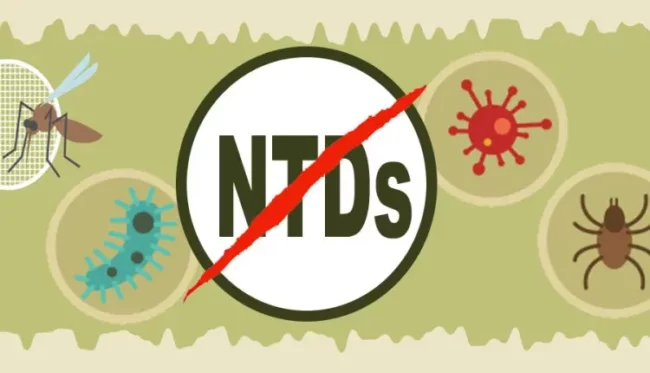The Federal Government, in collaboration with state governments, has convened an advocacy meeting to re-energize momentum to end the suffering caused by 21 life-threatening Neglected Tropical Diseases (NTDs) in Nigeria.
The advocacy meeting facilitated high-level strategic consultations on effective ways of supporting increased coordination between the federal and state ministries of health in disease elimination efforts across Nigeria.
The elimination efforts emphasized the provision of counterpart funding for donor-funded NTD interventions, increased budgetary allocations for NTD programs (including contributions to the Reaching the Last Mile Fund), improved policy coordination between state ministries of health and state primary healthcare development agencies, and enhanced logistics for the distribution of drugs in states and local government areas (LGAs).
The Coordinating Minister of Health and Social Welfare, Prof. Muhammed Ali Pate, in his ministerial speech at the high-level advocacy meeting with Commissioners for Health from the 36 states and the FCT, stated that the government would focus attention on the millions of people with little or no access to prevention, treatment, and care services, aiming to counter the social determinants of health in line with the Renewed Hope Agenda and Health Sector Strategic Blueprint/SWAP agenda of the Administration of President Bola Ahmed Tinubu.
ALSO READ: NLC commends Kano gov over implementation of N71,000 minimum wage
Prof. Pate, who was represented by the Minister of State for Health, Dr. Iziaq Salako Adekunle, also noted that the rollout of the ten-year NTD roadmap for 2021 to 2030 by the World Health Organization (WHO) in January 2021 sets ambitious targets and innovative approaches to tackle NTDs. This roadmap provides a blueprint and direction for global elimination.
He added that the plan promotes an integrated approach to delivering programs, with an emphasis on three significant approaches: moving from process to impact measurement for accountability, implementing effective multi-sectoral approaches/integration across NTDs, and ensuring country ownership and political commitment for sustainability.
He announced that Nigeria is one of the few countries that have developed/reviewed its NTD Masterplan 2023–2027, which was launched in January 2023 and is being used as an advocacy tool by all stakeholders to achieve the 2030 target.
“Nigeria supports efforts to engage with disease-endemic countries, stakeholders, and partners to contribute to the development of the ‘Kigali Declaration on NTDs,’ which is proof of our collective commitment in the spirit of partnership for ownership of this important document, in line with the WHO roadmap.”
“It is gratifying to note that substantial progress has been made over the last decade, as evidenced by major achievements such as weaning 35 million people off ivermectin treatment in 10 transmission zones (states) across the country.”
“Elimination of Onchocerciasis in 2 states (Plateau and Nasarawa) and interruption of transmission in an additional 8 states (Kaduna, Kebbi, Zamfara, Delta, Imo, Abia, Enugu, Anambra).”
“About 39.5 million people across 20 states and the FCT no longer require LF treatment. There has also been an 84% reduction in the prevalence of trachoma infection in at-risk populations.”
“The 3.5 million people who no longer need MDA for trachoma are in 109 endemic LGAs across 17 states (Bauchi, Benue, Ebonyi, Edo, Jigawa, Kaduna, Kano, Katsina, Kebbi, Nasarawa, Niger, Plateau, Sokoto, Taraba, Yobe, and Zamfara).”
“We have also developed National LF MMDP guidelines and the LF dossier,” he added.
Earlier, the Permanent Secretary, Kachallum Daju, in her welcome address, disclosed that Nigeria bears the greatest burden of NTDs in Sub-Saharan Africa (25% of all NTDs), with millions of people at risk of infection, as shown by the following figures: Lymphatic Filariasis – 122 million, Onchocerciasis – 33 million, Schistosomiasis – 20.8 million, Soil Transmitted Helminths – 29.4 million, Trachoma – 5.3 million, and Human African Trypanosomiasis – 6.5 million people.
“It is in a bid to address this menace that world leaders built upon the London Declaration on NTDs to launch the Kigali Declaration, putting individuals and communities at the center to end NTDs, bringing us closer to achieving Universal Health Coverage (UHC) and the Sustainable Development Goals (SDGs).”
“Today’s event with the State Commissioners for Health and other key stakeholders is aimed at sharing the country’s portfolio on NTDs, reviewing the budgeting process for NTDs in the states, and encouraging states/FCT to embark on resource mobilization. The event also seeks to ensure that states/FCT are aware of their current status and discuss areas for program integration in line with the SWAP agenda,” she said.
Get real-time news updates from Tribune Online! Follow us on WhatsApp for breaking news, exclusive stories and interviews, and much more.
Join our WhatsApp Channel now
